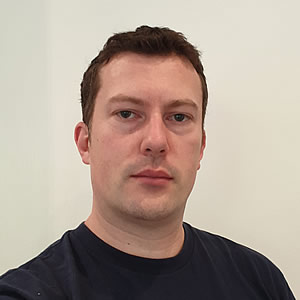
Andrew Owen, a dual speciality trainee in anaesthesia and critical care, explains how his research career has progressed as an NIHR Academic Clinical Fellow and an NIHR Clinical Lecturer.
Published: 30 October 2019
More information on the NIHR Academic Clinical Fellowship (ACF) and the NIHR Clinical Lectureship (CL) are available on the NIHR website.
Andrew Owen is an NIHR Clinical Lecturer and a dual specialty trainee in anaesthesia and critical care working in the West Midlands.
Where it began
Andrew began his university life studying computer science in Manchester, but then his career plans took a major change of course when he moved to Birmingham to study medicine.
“I had always liked the idea of studying medicine but was not originally offered a place,” Andrew said. “Having maintained this interest during my undergraduate studies in computer science I decided to try again and was successful in gaining a place at medical school. In retrospect being a little bit older when I started my medical training helped me focus and I have no doubt that I did better because of this."
After foundation training he applied for an Acute Care Common Stem (ACCS) programme to specialise in anaesthesia and secured an NIHR Academic Clinical Fellowship (ACF) in Intensive Care Medicine (ICM).
An NIHR ACF is a clinical specialty training post in medicine or dentistry which incorporates academic training. The post generally lasts for three years (four as a GP) and involves 75% of your time being spent in clinical training with the other 25% in research or educational training. Each year the NIHR funds around 250 ACFs in medicine with applications being accepted for the current round until 4 November 2019*.
“An ACF enabled me considerable flexibility in my training with protected research time,” Andrew said.
“My academic time was split between assisting with a clinical trial of cytomegalovirus suppression in critical care and undertaking basic science research into mesenchymal stem cell (MSC) biology in the Centre for Liver Research.
“For me this represented the most efficient way of combining academia with clinical training.”
Freedom to explore other areas of interest
While undertaking his ACF, Andrew enrolled in the Birmingham MRes programme and submitted a thesis based on his research into MSC biology. Using preliminary data generated in his ACF Andrew was awarded a Medical Research Council (MRC) Clinical Research Training Fellowship (CRTF) at the University of Birmingham.
Following completion of his PhD he was subsequently successful in being awarded an NIHR Clinical Lectureship (CL) in March 2018 enabling dual specialty training in anaesthesia and critical care where he continues to study stem cell and stromal cell biology.
Reflecting on the path his career has taken, Andrew said: “My NIHR awards have enabled me to undertake focussed periods of research with some funding to support travel and conference attendance. This freedom has enabled me to explore areas of interest that I would have otherwise found difficult.
“Whilst there have been many challenges during my ACF and CL, I think the most important thing is to maintain focus when there are many possible directions and opportunities to take.”
Summing up with his top tip for others wanting to follow in his footsteps, he said: “Believe in yourself when others don’t - but be prepared to be wrong.”
Commenting on the decision to train in multiple specialties in academia, he said: “I’ve always pursued the interests in work that I enjoy the most. This isn’t always easy and I am acutely aware that you can’t do everything. Having multiple back up plans and understanding that there are many ways to achieve the same goal has been the most important strategies to help me succeed.
“Success starts at home,” he added. “I have a very supportive wife and three wonderful children. Without my personal life to both support and distract me I would not be where I am today.”
Andrew is a trainee representative on the National Institute of Academic Anaesthesia (NIAA) board and co-opted to the Royal College of Anaesthetists trainee committee as an academic representative. He is also a member of Mercia Accident Resuscitation Service (MARS) and the West Midlands CARE Team responding to trauma and medical incidents as a clinical lead and has recently been offered position with Midlands Air Ambulance as a Helicopter Emergency Medical Service (HEMS) Doctor.
More information on the NIHR’s Your Path in Research page is available on the NIHR website.
Details of the NIHR Academic Clinical Fellowship (ACF) and the NIHR Clinical Lectureship (CL) are available online.


